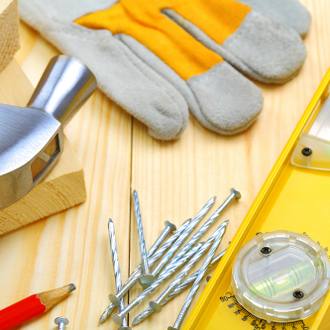Where can I find advice on how to use and maintain hardware?
Index
Any DIY home improvements will be simpler with good home hardware tools and materials.

Power tools
Power tools make home improvement projects faster and less labour-intensive. Learn about major power tools, how to maintain them and use them safely.
Electric Hand Drill
The electric hand drill may very well be the most overworked of all tools. It doesn’t just drill holes; attachments allow it to also polish, sand and grind. Due to its frequent usage, maintenance is especially important. Drill bits should always be sharp. So, either sharpen or replace them when required. If your hand drill is cordless, remember to recharge the batteries when necessary so it’s ready when you need it next.
Power Sander
There are a couple kinds of power sanders. Whichever one you have, follow these maintenance tips to ensure your tool stays in great shape for a long time. Sanders accumulate dust quickly. When grime gunks up internal mechanisms or builds up on the fan, your sander can overheat and stop working. To prevent this, regularly clean the fan and remove dust from the air openings using a brush, compressed air or simply filling your lungs with air and blowing on those areas. Always ensure the sandpaper is aligned correctly; if it’s off, sparks may fly from the platen assembly, or the sandpaper might veer to one side or slide off.
Jig Saw
The jig saw is most recognized for its ability to maneuver tight corners and cut curves in wood. But it can cut through other materials, too, such as metal, drywall, rubber, leather and asphalt. Most problems people have with this machine are caused by their misuse of it. Poor practices often make it overheat and eventually burn out prematurely. Let the motor reach maximum speed before engaging the blade in the work piece. Adjust the speed according to your material: faster for softer surfaces, slower for hard mediums. If you notice spots with wood burns, it’s time to sharpen the blade. If you don’t have the right tools, hire a pro to sharpen it for you.
Chain Saw
Ideal for felling trees or chopping logs, the chain saw is supremely helpful for strenuous projects. It can do a lot if you take care of it. Keep key areas free and clear of debris and dirt particles to ensure the chain saw doesn’t lose power, run erratically, overheat or stop working. Specifically, clear blocked fuel cap vents with a toothpick. Clean a paper air filter by tapping it against a hard surface to knock dirt loose. If the filter’s made of mesh or other materials, use a screwdriver to disassemble sections of it. Then, wash it with water and a household detergent. Let pieces dry completely before screwing it back together. Check the chain for correct tension and sharpen it as needed so it cuts evenly
Hand Tools
Hand tools provide simple and portable means for completing a home improvement or woodworking project. Learn how to safely use and maintain your hand tools.
Toolbox Necessities – You can build your own basic toolbox to include common repair tools such as:
- A 400 or 450g hammer
- Standard and Phillips screwdrivers
- Pliers
- An adjustable wrench
- An adjustable wrench
- A basin wrench
- A 5cm paintbrush
- A handsaw or power saw
- A hand drill or power drill
- Assorted fasteners
- Glues and adhesives for wood and plastic
How to Safely Use a Hammer
To safely use a claw hammer, select the weight appropriate to the fastener to be struck. A 200g, 250g or 350g hammer is adequate for tacks, brads, and small finish nails; 500g or larger hammers are used for framing and roofing. Firmly grasp the lower half of the handle, slowly swing the head face, and touch the fastener head squarely to determine trajectory. Make sure your hand will not be struck by the hammer head or handle. Then swing the hammer with more force to drive the head into the wood. Continue striking the fastener head squarely to drive it into the material.
How to Safely Use a Clamp
To safely use a clamp, first determine which type of clamp is required for the job. Then make adjustments needed to the screw to accommodate the objects. Spring clamps only require that pressure be applied to the handles to open the clamp’s jaws. Close the jaw around the object by turning the screw or releasing the handles. For safety, make sure that fingers and skin are not pinched by the frame, screws, or jaws.
How to Safely Use a Screwdriver
To safely use a screwdriver, first select the appropriate tip and size to fit the fastener’s head. The fastener may require that a starter hole be made with a drill or by pressing the tip into the material. Insert the screwdriver tip into the screw head and turn the handle clockwise, applying pressure on the handle to hold the tip firmly in the head. Continue turning the screwdriver firmly, making sure the screw remains straight as it enters the material. Make sure your hand is away from the screw in case the screwdriver slips off the screw head.
Become familiar with home improvement tools and materials by making use of the many on-line and instore resources available from hardware retailers.
